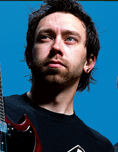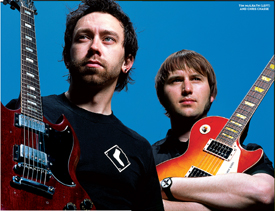The New Guitar Gods: Rise Against


As the Warped Tour scene splinters into punk subgenres, Rise Against continue to wave the banner for pure melodic hardcore on their latest disc, The Sufferer & the Witness
Destiny grabbed Rise Against’s Tim McIlrath by the shoulders when he was just 14 years old. “A whole bunch of my friends started snowboarding,” he recalls. “I saved up $400 and found a snowboard I wanted to buy. I was like, ‘Okay, I’m gonna be a snowboarder. That’s it.’ But as I was walking down to the snowboard shop, I passed by a guitar shop, and in the window there was a 1984 Gibson SG, just sitting there. I fell in love with it and bought it. I never got the snowboard. I’ve never even been snowboarding. But I’ve still got that guitar, and I’ve used it on every record I’ve played guitar on.”
McIlrath’s $400 investment has paid off in spades for the Chicago-based act. Rise Against are one of the hottest bands on the current Warped Tour. Their last album, Siren Song of the Counter Culture, sold nearly 400,000 copies, and their new disc, The Sufferer & the Witness (Geffen), is heavily tipped to do just as well. McIlrath, co-guitarist Chris Chasse, bassist Joe Principe and drummer Brandon Barnes blend churning hardcore rhythms and punk melodicism with an undercurrent of political rage. The net result is very much in the spirit of bands like Bad Religion and Fugazi, two of McIlrath’s key influences.
“That was the music that touched me when I was growing up,” says the singer/guitarist/lyricist. “The hardcore bands taught me that if someone gives you a microphone and a stage to say something, then you’d better say something.” The album title The Sufferer & the Witness encapsulates McIlrath’s take on political apathy. “There’s a lot of that in our country right now. But apathy doesn’t make you innocent of what’s going on. There’s so much suffering that happens in our country and the world, and if you’re not the one suffering then you’re bearing witness to it. Either way, you’re involved; you can’t turn a blind eye. Living in America, we’re obviously not the sufferers in the big scheme of things, so that makes us the witnesses. But at the same time, the phrase can be applied to a relationship between two people: who’s the sufferer and who’s the witness? It’s an interesting way to place yourself in any situation.”
The album is filled with rabble-rousing calls to action, like the incendiary “Bricks.” The track “Survive” will strike a chord with anyone struggling to get by in these desperate times. In fact, survival is a key theme on the album and one that strikes close to home for McIlrath and his band.
“As a punk band going into our seventh year of existence and our fourth album, survival is a big part of what we do. Some of us are approaching our thirties; some of us are already there. And you’re talking about playing a scene where there’s some 18-yearold kid with fancy hair who wants your job. So you’re out there trying to remain relevant, pushing yourself to remain true to your fans and yourself.”
McIlrath and Principe cofounded Rise Against in 1999, taking their cue from Chicago’s punk scene. “I was really into the local scene,” says McIlrath. “Bands like the Boll Weevils and Cap’n Jazz. If you weren’t from Chicago you’d have no idea who these bands were. But it was a great, inspired scene to be around.”
Get The Pick Newsletter
All the latest guitar news, interviews, lessons, reviews, deals and more, direct to your inbox!
To this day, McIlrath and Principe remain the songwriting nucleus of Rise Against. “Joe’s strong point is ultrafast hardcore punk,” McIlrath explains. He points to new songs like “Bricks”—“a minuteand- a-half blast of pure punk”—and the bass-heavy “Drones” as examples. “Those are classic Joe-style tracks.” The “big rock” tracks, like “Prayer of the Refugee” and “Ready to Fall,” are his own. “I’m a sucker for the big rock stuff,” says McIlrath. “But Joe and I collaborate on almost everything, so there’s a little of each of us in all the songs.”
On Rise Against’s debut album, The Unraveling, McIlrath left the guitar playing to the band’s original axman, Dan Precision, so he could focus solely on his singing. But by the time the band recorded the sophomore Rise Against disc, Revolutions per Minute, the singer was inevitably drawn into the six-string fray. “I had a lot of [guitar] ideas that I wanted to bring into band practice,” he recalls. “So I brought in my guitar and Marshall stack. And as we were writing the songs that became Revolutions per Minute, a lot of dual-guitar parts materialized. We realized it sounded really good, so I was more than happy to play guitar. But we’ve always maintained that dichotomy where half the live set is me on guitar and the other half is me jumping around singing. I like to break down the barriers that separate us from the crowd, and there’s no better way to do that than jumping down in their faces and sweating and spitting all over each other.”
The making of Rise Against’s third album, Siren Songs for the Counter Culture,, brought the band through several significant rites of passage. First, it was their major-label debut. “We didn’t know anything about being on a major label,” says McIlrath, “so it was a giant learning experience. There’s certainly a lot more bureaucracy going on. You can’t get away with just lifting quotes from movies anymore and putting them in your songs. There’s a lot of stuff like that to learn. We made a giant transition.”
Another shift occurred during the writing of Siren Songs. When Dan Precision left the band, Chris Chasse became Rise Against’s new lead guitarist. “We’ve known Chris for years,” says McIlrath. “We toured with his prior band, Reach the Sky, in the early days, when we were just trying to scrape by, touring across Texas playing for 15 kids a night. Experiences like this brought us really close to Chris. So when we needed a new guitar player, I immediately knew who to call.”
“This is my first position as a lead guitar player,” says Chasse. “I’d never done leads before. But I was already so familiar with this band’s style that it wasn’t hard to fit in. And they’re all so easy to get along with. They were in the middle of the songwriting process for Siren Songs when I joined, and they included me in that right away. I joined in February and we began recording in March, so it was a very quick transition for me: learn all the old songs, start writing new ones and make a record. I played my first show with them on May 1st and it was the band’s biggest to date.”
By the time sessions for The Sufferer & the Witness began, Chasse was a fully played-in band member, with hundreds of gigs under his belt. The album project reunited Rise Against with producers Bill Stevenson (Black Flag, Descendants) and Jason Livermore at the Blasting Room studio in Fort Collins, Colorado. This was the production team and studio that had helped usher Revolutions per Minute into existence.
“We developed a great relationship with Jason and Bill working on Revolutions,” says McIlrath. “And the more you progress in your career, the more you realize how special things like that are. We wanted to revisit that relationship to make The Sufferer & the Witness.”
For most of the record, both McIlrath and Chasse played the same Gibson 1960 reissue Les Paul Custom, although Tim also used his trusty ’84 SG as well as a Gibson hollowbody electric for the ballad “Roadside.” Amps included various Marshalls, a Seventies Hiwatt head, Mesa Stiletto Deuce and Dual Rectifier heads, plus a Vox AC30 and Fender Twin for cleaner tones. The guitars and bass are tuned down a half step.
“We started tuning down on our second record and we maintain that to this day,” says McIlrath. “I think the sound just comes out a little heavier that way. But it’s nothing too crazy. It’s not some drop-D or -C tuning, so we don’t come off like some real low-tuning metal band. It just adds a darker texture to the sound.”
While The Sufferer & the Witness sticks close to a hardline loud/fast aesthetic, the band does branch out on the aforementioned “Roadside,” the first Rise Against song to boast a string arrangement. “There are times in a band when you feel like, Shit, are we just a one-trick pony?” says McIlrath. “So it’s cool to break out of the mold and prove to yourself that you can be multidimensional.”
For the most part, though, Rise Against continue to wave the melodic punk banner at a time when many of the Warped bands are going Goth and/or prog-metal. In fact, Chasse is a little anxious about the future of punk as a distinct genre.
“All the punk bands out there are great,” says Chasse. “But I can’t remember the last time I heard a new punk band. I can’t remember the last time I was able to say, ‘Hey, check out this new punk band.’ I want to hear what the 16-year-olds have to add to the punk scene. I want to hear from the kids that grew up on Rise Against.”
“A virtuoso beyond virtuosos”: Matteo Mancuso has become one of the hottest guitar talents on the planet – now he’s finally announced his first headline US tour
“His songs are timeless, you can’t tell if they were written in the 1400s or now”: Michael Hurley, guitarist and singer/songwriter known as the ‘Godfather of freak folk,’ dies at 83









